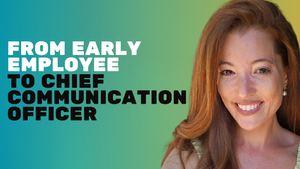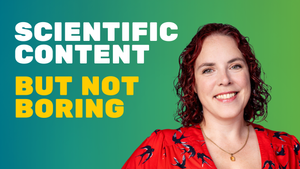Whether you're aspiring to a career in science communication or you're already an expert in the field, I often come across certain questions that people ask about the field.
So, without further ado, here are my answers to these frequently asked questions:
What is science communication and why does it matter?
Science communication, often called SciComm, involves crafting content that educates about scientific topics.
This content covers a wide range, including written articles, videos, and even live presentations.
Why is it important?
Recent issues surrounding misinformation about vaccines illustrate the importance of educating our population, especially in scenarios such as a pandemic that threatens millions of lives.
Given that science can be somewhat enigmatic (if not completely opaque), effective communication is essential to inform the public about the potential political, moral, or legal implications of new technologies.
So basically, communicating about science is not just a fulfilling activity; it's a service to society.
What are the different types of SciComm?
Science communication can be primarily categorized into two groups: outreach and inreach.
Outreach is what typically comes to mind when thinking about science communication: an expert, usually a scientist or a journalist, sharing scientific knowledge.
This encompasses areas like science journalism, health communication, and even the type of science communication found in museums.
On the other hand, inreach involves expert-to-expert communication, prevalent in trade publications, academic journals, or industry-focused materials.
These two realms are increasingly converging, especially as researchers are now often encouraged to incorporate elements of scientific dissemination in their work.
That's why it's increasingly common to see scientists taking center stage on social media platforms, for instance.
What skills are essential for a career in science communication?
Pursuing a career in science communication requires proficiency in several key skills:
Strong understanding of scientific concepts: While you don't need to be an expert in every field, having a solid foundation and the ability to understand and interpret scientific data is crucial.
Good written communication skills: Whether it's writing articles, creating content for social media, or engaging in public speaking, everything you do as a science communicator involves writing. It's not just about what you write but how you write it. Knowing when and how to adapt your language to your audience is vital.
Storytelling ability: Science can be hard to digest without the proper dose of storytelling. Everyone loves a good story. Storytelling isn't just for science journalism; it's also valuable in making SciComm more appealing within the scientific community.
Critical thinking and analytical skills: Science communication often involves dissecting research findings and discussing their implications. Being able to critically analyze scientific information, identify key points, and anticipate audience questions or misconceptions is important.
Adaptability and continuous learning: With science constantly evolving, staying informed of the latest research and trends is essential. But, as with any communication role, this also means being open to feedback (such as from an editor) and embracing new tools like AI will make a significant difference in the long run.
Networking and collaboration: Building relationships with scientists, other communicators, and the media is part of the job. So, it's important to enjoy connecting and interacting with others.
What kind of job opportunities exist in science communication?
Let’s explore the most common roles you might encounter in your science communication career:
Science journalist: In this role, you'll write and report on scientific news for various media outlets, such as newspapers, magazines, and digital platforms. The job might involve translating complex science for a general audience or writing for a more advanced audience in trade publications.
Public relations: Here, you'd be responsible for managing the public image and communications of research institutions, universities or science-based companies. This includes writing press releases, organizing events and handling media inquiries. Marketing skills are also an asset in this versatile role.
Outreach coordinator: These professionals work with scientific institutions or non-profits to develop and implement programs that engage the public or specific communities in science, including organizing workshops, lectures, and interactive events.
Museum or science center staff: Working in museums or science centers, you could be involved in exhibit design, educational program development, or as a science communicator presenting information to visitors.
Academic or research communicator: Many universities and research institutes hire professionals to communicate their research findings to the public, potential funders, or policymakers. This role can include writing summaries of research papers, creating content for websites, or developing informational materials.
Social media manager: With the rise of digital media, there's a growing need for experts who can effectively communicate science on social media platforms. This role involves creating engaging content, managing online communities, and analyzing audience engagement.
Corporate communication: Companies in sectors like biotech, pharmaceuticals, environmental technology, and others, often require communicators to explain their scientific work and implications to stakeholders, investors, and the public.
Science policy advisor: These communicators work at the intersection of science and policy, translating scientific findings into policy recommendations and guiding decision-makers on issues like public health, environmental policy, and technological regulation.
Of course, there are some nuances in all of these roles, and you may even find some positions that are a mix of several of the jobs listed here.
Another common path in SciComm is to become a freelance science communicator, most often a science writer.
This gives you the flexibility to work for a wide range of institutions, publishers or companies without getting stuck in one role.
Of course, this also means that you'll have to build your own business, which can be daunting for some people.
Also, keep in mind that within the field of science writing, there are several specialties, such as technical or medical writing, that require their own set of skills.
Do I need a specific degree to pursue this career?
Short answer: nope.
But in reality, a solid foundation in science is always welcome.
And it kind of makes sense.
Without a basic understanding of science, it will be difficult for you to understand the subject you are talking about.
But this also doesn’t mean that you need a PhD in science to be a good science communicator.
I've encountered many talented individuals in this field who didn't even have a bachelor's degree in science.
If you're a fast learner and naturally curious, you can learn the basics of science on your own and build your way up to more complex science over time.
On the flip side, if you are already a scientist, some positions may be more accessible to you.
My advice is to start with the skills you already possess and work on developing those you lack.
For example, if you're fresh out of journalism school, immerse yourself in reading a lot of science books.
On the other hand, if you're transitioning from a PhD to a career in SciComm, focus on honing your writing skills.
How can I get started in a SciComm career?
To me, it all begins with your portfolio.
A portfolio, or writing sample, is essentially a collection of your past work in science communication, and it's incredibly important for securing a job in this field.
Think of it like hiring a craftsman for your house: you'd first check their previous work and reviews.
It's the same in SciComm; recruiters will typically request a portfolio to gauge your skills.
The challenge often comes when you're just starting out and have nothing to show, which is understandable.
Here's an important tip that many beginners overlook: Start now!
Create a science blog, volunteer to write for a publisher, or just write science posts on social media.
The most important thing is that you have something to show, something that represents your skills and ambition.
If you want to get a permanent job or even freelance work, this is where you should start.
What are the challenges in this career?
As I've mentioned earlier, it can be tough to secure a job without prior work to showcase.
However, this can be overcome with a bit of effort and patience.
Another challenge is keeping up with scientific advances, especially if you are interested in a more technical position.
Reading a lot is often essential (and that's true of any writing position, regardless of industry).
But it can also be a challenge when deadlines pile up (any freelance writer knows what I'm talking about).
So be sure to include a healthy dose of keeping up with science news in your schedule.
When you go freelance, you also face the challenge of finding your first clients.
That's where networking skills come in handy.
Many freelancers are also active on social media, especially LinkedIn, and generate their leads from there.
So that might be a good place to start.
What's the job market like for science communicators?
I'm not an expert on the job market, but from what I've seen in the last 10 years, I've rarely met anyone in this field who's been unemployed for too long.
There are some nuances to this, of course, and depending on the specific position you're after, it may be more or less difficult to find a job.
In my opinion, the safer career paths in science communication are in specialized areas such as technical or medical writing.
Those are often high-demand fields, and they are growing rapidly, especially in the United States, as you can see on this chart:
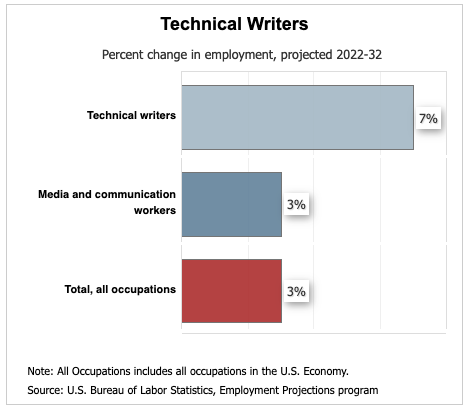
Still in the US, the average salary for scientific writers has been on the rise for many years:
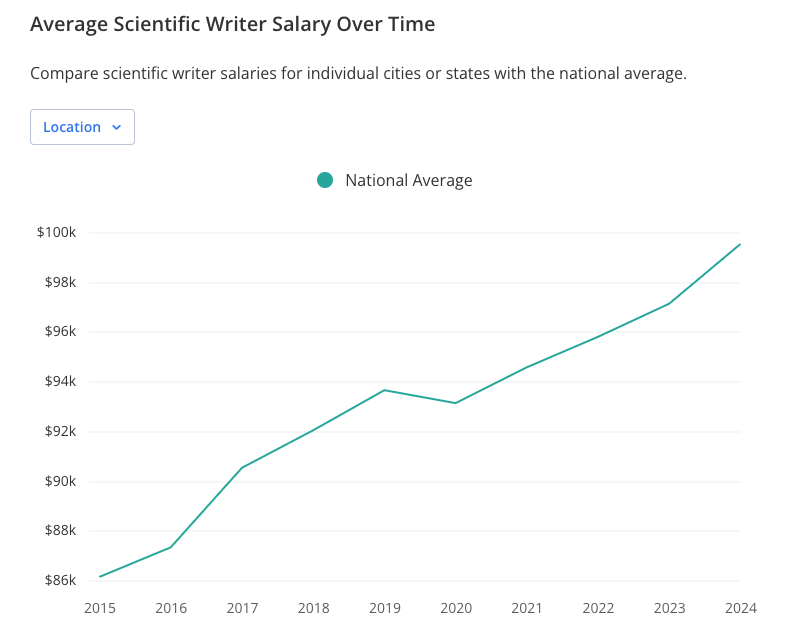
And this is the salary you can expect in the US, based on your seniority:
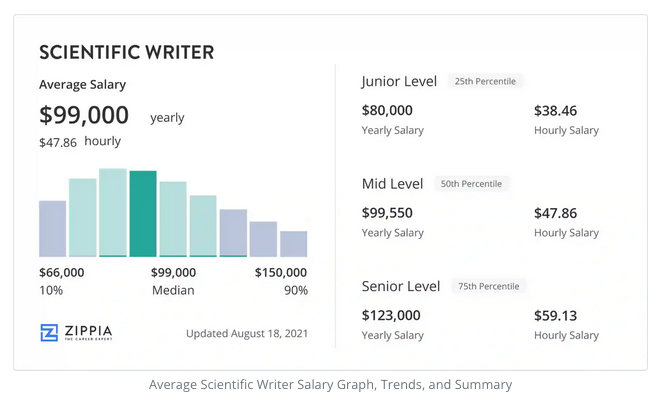
Salaries are lower in Europe, but that's to be expected for any position:

In any case, choosing science communication as a career has the advantage of offering a great deal of opportunity for a meaningful role.
How can we measure the effectiveness of science communication?
Beyond the apparent societal benefits, you might wonder about the real utility of science communication.
Let me share my favorite example that illustrates its impact: the “Scully Effect”.
For those born like me in the 90s, you're probably familiar with The X-Files, a science-fiction TV show featuring FBI agents Mulder and his scientist colleague Scully, investigating paranormal activities.
Well, it turns out that having a badass female scientist character on TV has driven women into STEM careers.
This is an extreme example of “science communication” being twisted for TV ratings, but it's a powerful demonstration of how presenting science in an engaging way can have a positive impact on society.
But I think it's even more important to measure the impact of the lack of science communication.
Take this study measuring confidence in the COVID-19 vaccine during the pandemic.
In March 2021, several European countries temporarily suspended the use of the AstraZeneca vaccine after rare cases of thrombosis and pulmonary embolism were reported.
Following a formal investigation by the European Medicines Agency (EMA), which quickly made headlines around the world , it was concluded that the benefits of the vaccine still outweighed the risks, despite a possible link to rare blood clots.
However, this did not reduce the concerns of those with less trust in science, leading to vaccine hesitancy in this part of the population:
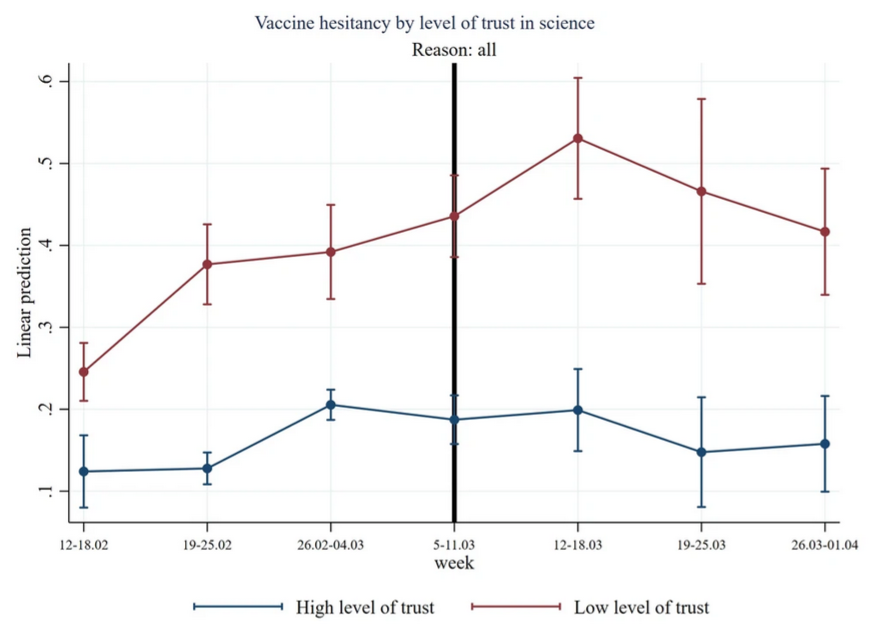
This scenario illustrates the critical role of effective science communication in addressing public concerns and misconceptions, especially in health-related issues.
And with the rise of AI tools and potential misinformation, our role as science communicators has never been more important.
Where can I find out more about SciComm?
Well, you can start by subscribing to my newsletter.
I share a new article every week to help you gain more experience in the field, so this might be handy if you are looking for an easy way to learn new stuff for free.
I also recommend checking out the Science Writing News Roundup newsletter from Marianna Limas, which is always full of good links.
The Open Notebook and the Association of Health Care Journalists also have a lot of useful resources and hold regular trainings if you have some budget for this.
Finally, be sure to check out my blog archive, especially the articles that might be useful for getting started:
- 4 Reasons Why You Should Not Quit Your PhD To Go Into Science Communication
- Science, Technical, or Medical Writer: Who Should You Hire?
- The Ultimate Guide To Content Marketing in Life Sciences
And don't hesitate to contact me or connect with me on LinkedIn if you have any questions.
Good luck finding your dream job!




